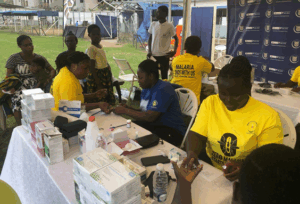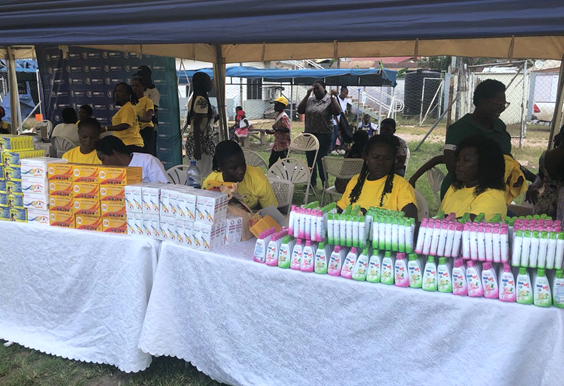By Juliet Aguiar DUGBARTEY
Clement Amankwah, the Western Region Malaria Focal Person, has revealed that malaria continues to top Out Patients Department (OPD) attendance cases in the region despite several interventions.
He revealed that there was a 12.4% increase in malaria cases across the region – from 470,062 cases in 2023 to 528,937 in 2024.
The disease, he said, continues to top OPD morbidity charts and this trend must change if institutions aim to eliminate malaria.
Mr. Amankwah was speaking at the World Malaria Day event organised by Gold Fields Ghana Foundation in partnership with the Tarkwa Nsuaem Municipal Health Directorate at Tarkwa in Western Region.
It was on the theme ‘Malaria Ends With Us: Reinvest, Reimagine, Reignite’. The day was filled with activities such as clean-up exercises, malaria awareness and screening as well as distribution of mosquito repellents among others.
Mr. Amankwah continued that Tarkwa Nsuaem ranks sixth among districts with highest number of malaria cases in the region.
He mentioned districts with the highest burden including Wassa Amenfi Central, Wassa East, Ellembelle and Shama, with Effia Kwesimintsim, Sekondi-Takoradi and Ahanta West recording the lowest.
Madam Wilhemina Duah, Tarkwa Nsuaem Municipal Director of Health, noted that: “Despite years of interventions malaria, remains endemic and perennial in Ghana; posing high risk to children under five and pregnant women. It is unacceptable that this preventable and treatable disease still kills a child every minute globally”.
She said malaria prevalence in Tarkwa Nsuaem is rising among the general population – from 19.2% in 2022 to 27.9% in 2024.
Locally, Tarkwa Nsuaem saw 65,167 malaria cases out of 510,439 OPD attendances in 2024… representing 12.7% of all OPD visits. Although malaria among pregnant women dropped to 0.1% prevalence, the positivity rate among those tested increased sharply to 38.5% – raising concern over early detection and prevention effectiveness.
She cited Dompim, Simpa, Benso sub-municipal and Nsuaem as hotspot areas within the municipality, while Tarkwa town showed relatively lower prevalence due to its urban environment and improved sanitation.
She urged members of the community to maintain environmental hygiene by draining stagnant water and eliminating mosquito breeding sites such as used cans,car-tyres and open containers.
Madam Duah stressed the important and proper use of insecticide-treated nets (ITNs) to prevent malaria.

She pointed out that despite interventions, several challenges persist. These include: misuse or underuse of ITNs; non-adherence to malaria treatment protocol; inadequate coverage of intermittent preventive treatment in pregnancy (IPTP); as well as increased mosquito breeding due to illegal mining activities that create stagnant water in open pits.
“Mining activities, particularly illegal ones, have significantly contributed to increased mosquito breeding sites. This threatens the progress we’ve made,” Madam Duah added.
Sandra Deladem Woanyah, Project Manager for Gold Fields Ghana Foundation, reiterated the foundation’s commitment to health as a core focus area.
She said: “Over the past 20 years, we have invested heavily in health infrastructure, outreach and public education,” she said.
To mark World Malaria Day, the foundation organised a community clean-up in Akoon and Borborbo followed by free health screenings.
“We believe that healthy communities are empowered communities. Malaria is preventable and with joint efforts we can end it,” she concluded.










